Play audio — original link
Play audio
Play audio
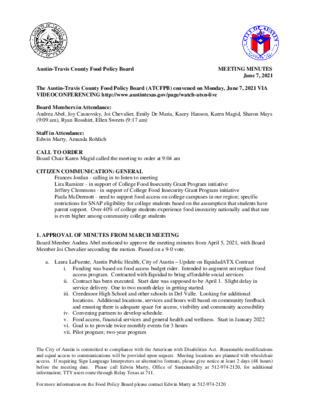
MEETING MINUTES June 7, 2021 Austin-Travis County Food Policy Board The Austin-Travis County Food Policy Board (ATCFPB) convened on Monday, June 7, 2021 VIA VIDEOCONFERENCING http://www.austintexas.gov/page/watch-atxn-live Board Members in Attendance: Andrea Abel, Joy Casnovsky, Joi Chevalier, Emily De Maria, Kacey Hanson, Karen Magid, Sharon Mays (9:09 am), Ryan Rosshirt, Ellen Sweets (9:17 am) Staff in Attendance: Edwin Marty, Amanda Rohlich CALL TO ORDER Board Chair Karen Magid called the meeting to order at 9:04 am CITIZEN COMMUNICATION: GENERAL Frances Jordan - calling in to listen to meeting Lira Ramirez - in support of College Food Insecurity Grant Program initiative Jeffrey Clemmons - in support of College Food Insecurity Grant Program initiative Paula McDermott - need to support food access on college campuses in our region; specific restrictions for SNAP eligibility for college students based on the assumption that students have parent support. Over 40% of college students experience food insecurity nationally and that rate is even higher among community college students 1. APPROVAL OF MINUTES FROM MARCH MEETING Board Member Andrea Abel motioned to approve the meeting minutes from April 5, 2021, with Board Member Joi Chevalier seconding the motion. Passed on a 9-0 vote. a. Laura LaFuente, Austin Public Health, City of Austin – Update on EquidadATX Contract i. Funding was based on food access budget rider. Intended to augment not replace food access program. Contracted with Equidad to bring affordable social services ii. Contract has been executed. Start date was supposed to be April 1. Slight delay in service delivery. One to two month delay in getting started. iii. Creedmoor High School and other schools in Del Valle. Looking for additional locations. Additional locations, services and hours will based on community feedback and ensuring there is adequate space for access, visibility and community accessibility iv. Convening partners to develop schedule. v. Food access, financial services and general health and wellness. Start in January 2022 vi. Goal is to provide twice monthly events for 3 hours vii. Pilot program; two-year program The City of Austin is committed to compliance with the American with Disabilities Act. Reasonable modifications and equal access to communications will be provided upon request. Meeting locations are planned with wheelchair access. If requiring Sign Language Interpreters or alternative formats, please give notice at least 2 days (48 hours) before the meeting date. Please call Edwin Marty, Office of Sustainability at 512-974-2120, for additional information; TTY users …
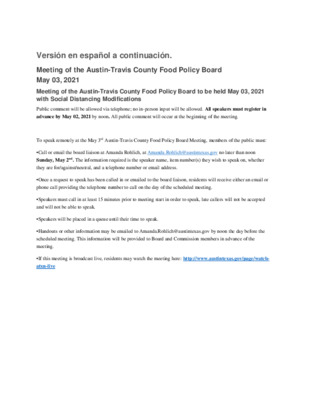
Versión en español a continuación. Meeting of the Austin-Travis County Food Policy Board May 03, 2021 Meeting of the Austin-Travis County Food Policy Board to be held May 03, 2021 with Social Distancing Modifications Public comment will be allowed via telephone; no in-person input will be allowed. All speakers must register in advance by May 02, 2021 by noon. All public comment will occur at the beginning of the meeting. To speak remotely at the May 3rd Austin-Travis County Food Policy Board Meeting, members of the public must: •Call or email the board liaison at Amanda Rohlich, at Amanda.Rohlich@austintexas.gov no later than noon Sunday, May 2nd. The information required is the speaker name, item number(s) they wish to speak on, whether they are for/against/neutral, and a telephone number or email address. •Once a request to speak has been called in or emailed to the board liaison, residents will receive either an email or phone call providing the telephone number to call on the day of the scheduled meeting. •Speakers must call in at least 15 minutes prior to meeting start in order to speak, late callers will not be accepted and will not be able to speak. •Speakers will be placed in a queue until their time to speak. •Handouts or other information may be emailed to Amanda.Rohlich@austintexas.gov by noon the day before the scheduled meeting. This information will be provided to Board and Commission members in advance of the meeting. •If this meeting is broadcast live, residents may watch the meeting here: http://www.austintexas.gov/page/watch- atxn-live Reunión del Austin-Travis County Food Policy Board FECHA de la reunion 3 de mayo de 2021 u por otra correo pueden folletos enviarse electrónico reunión se información La junta se llevará con modificaciones de distanciamiento social Se permitirán comentarios públicos por teléfono; no se permitirá ninguna entrada en persona. Todos los oradores deben registrarse con anticipación (2 de mayo de 2021 antes del mediodía). Todos los comentarios públicos se producirán al comienzo de la reunión. Para hablar de forma remota en la reunión, los miembros del público deben: • Llame o envíe un correo electrónico al enlace de la junta en Amanda.Rohlich@austintexas.gov, (512) 974-1364 a más tardar al mediodía (el día antes de la reunión). La información requerida es el nombre del orador, los números de artículo sobre los que desean hablar, si están a favor / en contra / neutrales, y un número de …
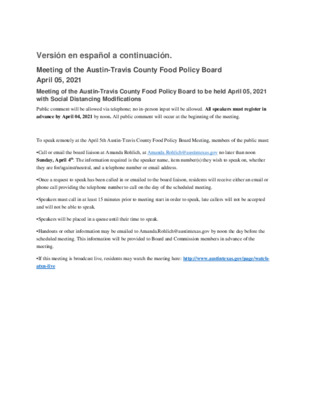
Versión en español a continuación. Meeting of the Austin-Travis County Food Policy Board April 05, 2021 Meeting of the Austin-Travis County Food Policy Board to be held April 05, 2021 with Social Distancing Modifications Public comment will be allowed via telephone; no in-person input will be allowed. All speakers must register in advance by April 04, 2021 by noon. All public comment will occur at the beginning of the meeting. To speak remotely at the April 5th Austin-Travis County Food Policy Board Meeting, members of the public must: •Call or email the board liaison at Amanda Rohlich, at Amanda.Rohlich@austintexas.gov no later than noon Sunday, April 4th. The information required is the speaker name, item number(s) they wish to speak on, whether they are for/against/neutral, and a telephone number or email address. •Once a request to speak has been called in or emailed to the board liaison, residents will receive either an email or phone call providing the telephone number to call on the day of the scheduled meeting. •Speakers must call in at least 15 minutes prior to meeting start in order to speak, late callers will not be accepted and will not be able to speak. •Speakers will be placed in a queue until their time to speak. •Handouts or other information may be emailed to Amanda.Rohlich@austintexas.gov by noon the day before the scheduled meeting. This information will be provided to Board and Commission members in advance of the meeting. •If this meeting is broadcast live, residents may watch the meeting here: http://www.austintexas.gov/page/watch- atxn-live Reunión del Austin-Travis County Food Policy Board FECHA de la reunion 5 de abril de 2021 u por otra correo pueden folletos enviarse electrónico reunión se información La junta se llevará con modificaciones de distanciamiento social Se permitirán comentarios públicos por teléfono; no se permitirá ninguna entrada en persona. Todos los oradores deben registrarse con anticipación (4 de abril de 2021 antes del mediodía). Todos los comentarios públicos se producirán al comienzo de la reunión. Para hablar de forma remota en la reunión, los miembros del público deben: • Llame o envíe un correo electrónico al enlace de la junta en Amanda.Rohlich@austintexas.gov, (512) 974-1364 a más tardar al mediodía (el día antes de la reunión). La información requerida es el nombre del orador, los números de artículo sobre los que desean hablar, si están a favor / en contra / neutrales, y un número de …
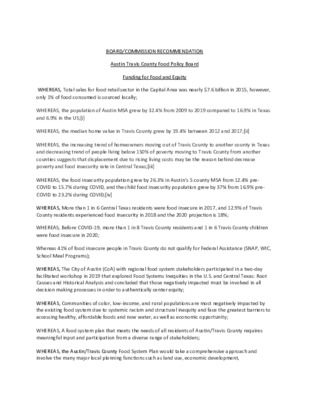
BOARD/COMMISSION RECOMMENDATION Austin Travis County Food Policy Board Funding for Food and Equity WHEREAS, Total sales for food retail sector in the Capital Area was nearly $7.6 billion in 2015, however, only 1% of food consumed is sourced locally; WHEREAS, the population of Austin MSA grew by 32.4% from 2009 to 2019 compared to 16.9% in Texas and 6.9% in the US;[i] WHEREAS, the median home value in Travis County grew by 19.4% between 2012 and 2017;[ii] WHEREAS, the increasing trend of homeowners moving out of Travis County to another county in Texas and decreasing trend of people living below 150% of poverty moving to Travis County from another counties suggests that displacement due to rising living costs may be the reason behind decrease poverty and food insecurity rate in Central Texas;[iii] WHEREAS, the food insecurity population grew by 26.3% in Austin’s 5 county MSA from 12.4% pre- COVID to 15.7% during COVID, and the child food insecurity population grew by 37% from 16.9% pre- COVID to 23.2% during COVID;[iv] WHEREAS, More than 1 in 6 Central Texas residents were food insecure in 2017, and 12.9% of Travis County residents experienced food insecurity in 2018 and the 2020 projection is 18%; WHEREAS, Before COVID‐19, more than 1 in 8 Travis County residents and 1 in 6 Travis County children were food insecure in 2020; Whereas 41% of food insecure people in Travis County do not qualify for Federal Assistance (SNAP, WIC, School Meal Programs); WHEREAS, The City of Austin (CoA) with regional food system stakeholders participated in a two‐day facilitated workshop in 2019 that explored Food Systems Inequities in the U.S. and Central Texas: Root Causes and Historical Analysis and concluded that those negatively impacted must be involved in all decision making processes in order to authentically center equity; WHEREAS, Communities of color, low‐income, and rural populations are most negatively impacted by the existing food system due to systemic racism and structural inequity and face the greatest barriers to accessing healthy, affordable foods and now water, as well as economic opportunity; WHEREAS, A food system plan that meets the needs of all residents of Austin/Travis County requires meaningful input and participation from a diverse range of stakeholders; WHEREAS, the Austin/Travis County Food System Plan would take a comprehensive approach and involve the many major local planning functions such as land use, economic development, transportation, environmental sustainability and resilience, watershed protection, …
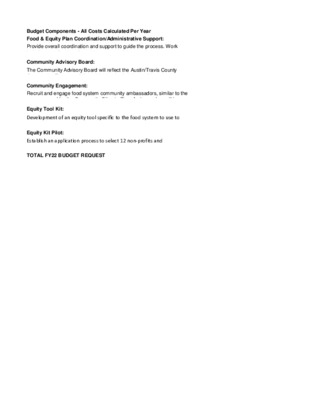
Budget Components - All Costs Calculated Per Year Food & Equity Plan Coordination/Administrative Support: Provide overall coordination and support to guide the process. Work includes coordinating all participants, organizing meetings, Community Advisory Board: The Community Advisory Board will reflect the Austin/Travis County Community. To ensure full participation in decision-making processes, Community Engagement: Recruit and engage food system community ambassadors, similar to the program used for the Community Climate Plan. Ambassadors will be Equity Tool Kit: Development of an equity tool specific to the food system to use to evaluate all food system decision-making. The tool and the process to Equity Kit Pilot: Establish an application process to select 12 non-profits and community-based organization to pilot the equity tool kit. Provide TOTAL FY22 BUDGET REQUEST 20 community advisory board members. At least 10 advisory board members will 10 ambassadors x $10,000 stipend Amount $125,000 $100,000 $100,000 $10,000 $65,000 $400,000
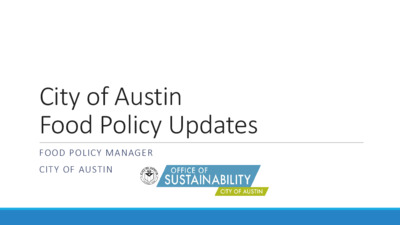
City of Austin Food Policy Updates FOOD POLICY MANAGER CITY OF AUSTIN Food Policy State Bill Tracking •STATE - OOS 87th TX Legislative Tracking •Elimination of SNAP Asset Test • HB 1230 (Rep Ortega) completely eliminates the SNAP vehicle asset test • Rep. Ortega will put out a committee substitute to raises the vehicle asset limit to $25,000 per vehicle and index that value to inflation. •SNAP eligibility: •Restrictive SNAP bills: • • • • • • HB 1353 (Rep Ortega) Relating to continued household eligibility for supplemental nutrition assistance program benefits on the ineligibility of the head of household for failure to comply with certain work requirements. HB 2126: (Rep Walle) expands SNAP access for college students HB 1211 (Rep Minjarez) eliminates the asset test when the state is designated under disaster declaration which would create serious administrative difficulties and could harm individuals by removing them from the program before their economic situation has improved HB 343 (Rep Caine) creates restrictions on what SNAP recipients can purchase HB 319 (Rep Springer) prohibits waiving work requirements for any SNAP recipient at any time SB 866 (Senator Creighton) would require a photo ID on all EBT cards - legislation that has been introduced in the past in TX to ‘reduce fraud’ but will actually create new barriers to applying for SNAP and increase the cost to the state Winter Weather Disaster Response - Uri Emergency Operation Center - Unmeet Needs Committee - After Action Report - Resolution 67 - The City Council creates the Winter Storm Uri Emergency Response Task Force under section 2-1-2(E) of the City Code for the purpose of holding open public listening sessions during which individuals and organizational representatives can share information, experiences, and recommendations related to the winter storm and resulting crises and to develop recommendations based on these sessions. City Council March 25th Resolution Response Resolution 066 – COVID Response ◦ Increasing agriculture and nutrition programs for individuals living in areas with limited access to grocery stores. This shall include a staff analysis determining various contracting mechanisms and options to achieve emergency food distribution to those negatively impacted by COVID-19, which could also be activated during a natural disaster; ◦ The City Manager is directed to report back to Council no later than April 16, 2021 regarding identified funding and methods for implementing or continuing the listed programs related to the Covid-19 pandemic, and the …
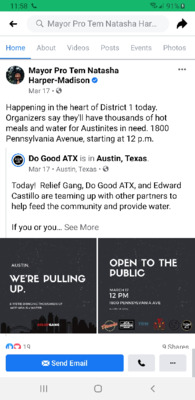
Backup
Play audio
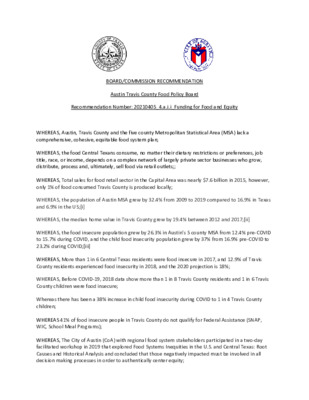
BOARD/COMMISSION RECOMMENDATION Austin Travis County Food Policy Board Recommendation Number: 20210405_4.a.i.i_Funding for Food and Equity WHEREAS, Austin, Travis County and the five county Metropolitan Statistical Area (MSA) lack a comprehensive, cohesive, equitable food system plan; WHEREAS, the food Central Texans consume, no matter their dietary restrictions or preferences, job title, race, or income, depends on a complex network of largely private sector businesses who grow, distribute, process and, ultimately, sell food via retail outlets;; WHEREAS, Total sales for food retail sector in the Capital Area was nearly $7.6 billion in 2015, however, only 1% of food consumed Travis County is produced locally; WHEREAS, the population of Austin MSA grew by 32.4% from 2009 to 2019 compared to 16.9% in Texas and 6.9% in the US;[i] WHEREAS, the median home value in Travis County grew by 19.4% between 2012 and 2017;[ii] WHEREAS, the food insecure population grew by 26.3% in Austin’s 5 county MSA from 12.4% pre-COVID to 15.7% during COVID, and the child food insecurity population grew by 37% from 16.9% pre-COVID to 23.2% during COVID;[iii] WHEREAS, More than 1 in 6 Central Texas residents were food insecure in 2017, and 12.9% of Travis County residents experienced food insecurity in 2018, and the 2020 projection is 18%; WHEREAS, Before COVID-19, 2018 data show more than 1 in 8 Travis County residents and 1 in 6 Travis County children were food insecure; Whereas there has been a 38% increase in child food insecurity during COVID to 1 in 4 Travis County children; WHEREAS 41% of food insecure people in Travis County do not qualify for Federal Assistance (SNAP, WIC, School Meal Programs); WHEREAS, The City of Austin (CoA) with regional food system stakeholders participated in a two-day facilitated workshop in 2019 that explored Food Systems Inequities in the U.S. and Central Texas: Root Causes and Historical Analysis and concluded that those negatively impacted must be involved in all decision making processes in order to authentically center equity; WHEREAS, Communities of color, low-income, and rural populations are most negatively impacted by the existing food system due to systemic racism, wealth, and structural inequity, and face the greatest barriers to accessing healthy, affordable foods and now water, as well as economic opportunity; WHEREAS, the Austin/Travis County Food System Plan would take a comprehensive approach and involve the many major local planning functions such as land use, economic development, transportation, environmental sustainability and resilience, …
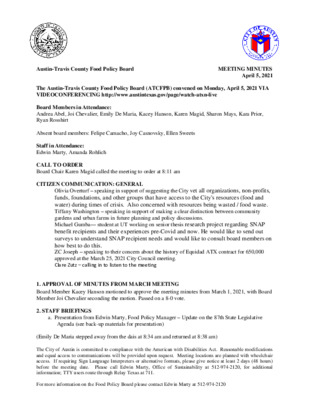
MEETING MINUTES April 5, 2021 Austin-Travis County Food Policy Board The Austin-Travis County Food Policy Board (ATCFPB) convened on Monday, April 5, 2021 VIA VIDEOCONFERENCING http://www.austintexas.gov/page/watch-atxn-live Board Members in Attendance: Andrea Abel, Joi Chevalier, Emily De Maria, Kacey Hanson, Karen Magid, Sharon Mays, Kara Prior, Ryan Rosshirt Absent board members: Felipe Camacho, Joy Casnovsky, Ellen Sweets Staff in Attendance: Edwin Marty, Amanda Rohlich CALL TO ORDER Board Chair Karen Magid called the meeting to order at 8:11 am CITIZEN COMMUNICATION: GENERAL Olivia Overturf – speaking in support of suggesting the City vet all organizations, non-profits, funds, foundations, and other groups that have access to the City's resources (food and water) during times of crisis. Also concerned with resources being wasted / food waste. Tiffany Washington – speaking in support of making a clear distinction between community gardens and urban farms in future planning and policy discussions. Michael Gumba— student at UT working on senior thesis research project regarding SNAP benefit recipients and their experiences pre-Covid and now. He would like to send out surveys to understand SNAP recipient needs and would like to consult board members on how best to do this. ZC Joseph – speaking to their concern about the history of Equidad ATX contract for 650,000 approved at the March 25, 2021 City Council meeting. Clare Zutz – calling in to listen to the meeting 1. APPROVAL OF MINUTES FROM MARCH MEETING Board Member Kacey Hanson motioned to approve the meeting minutes from March 1, 2021, with Board Member Joi Chevalier seconding the motion. Passed on a 8-0 vote. 2. STAFF BRIEFINGS a. Presentation from Edwin Marty, Food Policy Manager – Update on the 87th State Legislative Agenda (see back-up materials for presentation) (Emily De Maria stepped away from the dais at 8:34 am and returned at 8:38 am) The City of Austin is committed to compliance with the American with Disabilities Act. Reasonable modifications and equal access to communications will be provided upon request. Meeting locations are planned with wheelchair access. If requiring Sign Language Interpreters or alternative formats, please give notice at least 2 days (48 hours) before the meeting date. Please call Edwin Marty, Office of Sustainability at 512-974-2120, for additional information; TTY users route through Relay Texas at 711. For more information on the Food Policy Board please contact Edwin Marty at 512-974-2120 3. OLD BUSINESS a. Board Infrastructure & Protocol i. Review Board …
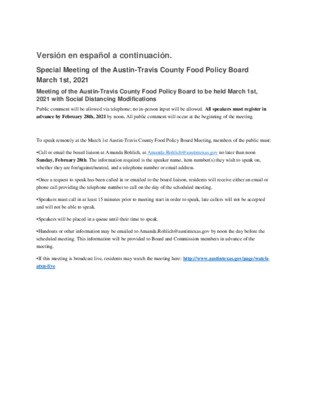
Versión en español a continuación. Special Meeting of the Austin-Travis County Food Policy Board March 1st, 2021 Meeting of the Austin-Travis County Food Policy Board to be held March 1st, 2021 with Social Distancing Modifications Public comment will be allowed via telephone; no in-person input will be allowed. All speakers must register in advance by February 28th, 2021 by noon. All public comment will occur at the beginning of the meeting. To speak remotely at the March 1st Austin-Travis County Food Policy Board Meeting, members of the public must: •Call or email the board liaison at Amanda Rohlich, at Amanda.Rohlich@austintexas.gov no later than noon Sunday, February 28th. The information required is the speaker name, item number(s) they wish to speak on, whether they are for/against/neutral, and a telephone number or email address. •Once a request to speak has been called in or emailed to the board liaison, residents will receive either an email or phone call providing the telephone number to call on the day of the scheduled meeting. •Speakers must call in at least 15 minutes prior to meeting start in order to speak, late callers will not be accepted and will not be able to speak. •Speakers will be placed in a queue until their time to speak. •Handouts or other information may be emailed to Amanda.Rohlich@austintexas.gov by noon the day before the scheduled meeting. This information will be provided to Board and Commission members in advance of the meeting. •If this meeting is broadcast live, residents may watch the meeting here: http://www.austintexas.gov/page/watch- atxn-live Reunión especial del Austin-Travis County Food Policy Board FECHA de la reunión 1ro de marzo de 2021 u otra folletos La junta se llevará con modificaciones de distanciamiento social. Se permitirán comentarios públicos por teléfono; no se permitirá ninguna entrada en persona. Todos los oradores deben registrarse con anticipación (28 de febrero de 2021 antes del mediodía). Todos los comentarios públicos se producirán al comienzo de la reunión. Para hablar de forma remota en la reunión, los miembros del público deben: • Llame o envíe un correo electrónico al enlace de la junta en Amanda.Rohlich@austintexas.gov, (512) 974-1364 a más tardar al mediodía (el día antes de la reunión). La información requerida es el nombre del orador, los números de artículo sobre los que desean hablar, si están a favor / en contra / neutrales, y un número de teléfono o dirección de correo electrónico. …
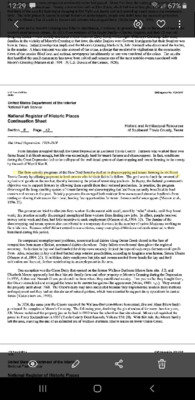
Backup
Play audio
Play audio
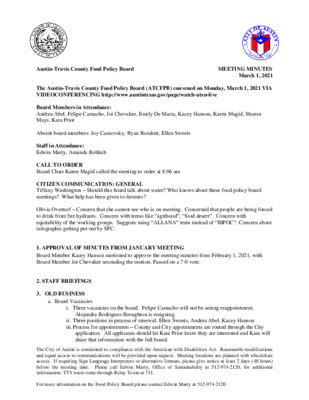
Austin-Travis County Food Policy Board MEETING MINUTES March 1, 2021 The Austin-Travis County Food Policy Board (ATCFPB) convened on Monday, March 1, 2021 VIA VIDEOCONFERENCING http://www.austintexas.gov/page/watch-atxn-live Board Members in Attendance: Andrea Abel, Felipe Camacho, Joi Chevalier, Emily De Maria, Kacey Hanson, Karen Magid, Sharon Mays, Kara Prior Absent board members: Joy Casnovsky, Ryan Rosshirt, Ellen Sweets Staff in Attendance: Edwin Marty, Amanda Rohlich CALL TO ORDER Board Chair Karen Magid called the meeting to order at 8:06 am CITIZEN COMMUNICATION: GENERAL Tiffany Washington – Should this board talk about water? Who knows about these food policy board meetings? What help has been given to farmers? Olivia Overturf – Concern that she cannot see who is on meeting. Concerned that people are being forced to drink from fire hydrants. Concern with terms like “agrihood”, “food desert”. Concern with equitability of the working groups. Suggests using “ALLANA” term instead of “BIPOC”. Concern about infographic getting put out by SFC. 1. APPROVAL OF MINUTES FROM JANUARY MEETING Board Member Kacey Hanson motioned to approve the meeting minutes from February 1, 2021, with Board Member Joi Chevalier seconding the motion. Passed on a 7-0 vote. 2. STAFF BRIEFINGS 3. OLD BUSINESS a. Board Vacancies i. Three vacancies on the board. Felipe Camacho will not be seeing reappointment. Alejandra Rodriguez-Broughton is resigning. ii. Three positions in process of renewal: Ellen Sweets, Andrea Abel, Kacey Hanson iii. Process for appointments – County and City appointments are routed through the City application. All applicants should let Kara Prior know they are interested and Kara will share that information with the full board. The City of Austin is committed to compliance with the American with Disabilities Act. Reasonable modifications and equal access to communications will be provided upon request. Meeting locations are planned with wheelchair access. If requiring Sign Language Interpreters or alternative formats, please give notice at least 2 days (48 hours) before the meeting date. Please call Edwin Marty, Office of Sustainability at 512-974-2120, for additional information; TTY users route through Relay Texas at 711. For more information on the Food Policy Board please contact Edwin Marty at 512-974-2120 4. NEW BUSINESS iv. Comments from Felipe Camacho who will not be seeking reappointment. Believes there needs to be agriculture lawyer to add to the board expertise. a. Board member/Working Group briefings on winter storm i. Board Member Joi Chevalier – Alarming that there was not a …
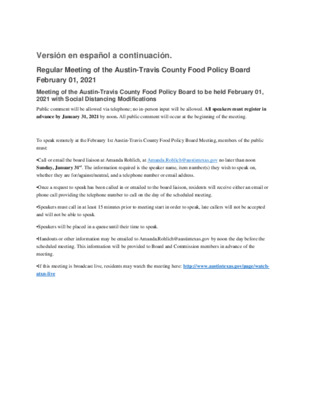
Versión en español a continuación. Regular Meeting of the Austin-Travis County Food Policy Board February 01, 2021 Meeting of the Austin-Travis County Food Policy Board to be held February 01, 2021 with Social Distancing Modifications Public comment will be allowed via telephone; no in-person input will be allowed. All speakers must register in advance by January 31, 2021 by noon. All public comment will occur at the beginning of the meeting. To speak remotely at the Febraury 1st Austin-Travis County Food Policy Board Meeting, members of the public must: •Call or email the board liaison at Amanda Rohlich, at Amanda.Rohlich@austintexas.gov no later than noon Sunday, January 31st. The information required is the speaker name, item number(s) they wish to speak on, whether they are for/against/neutral, and a telephone number or email address. •Once a request to speak has been called in or emailed to the board liaison, residents will receive either an email or phone call providing the telephone number to call on the day of the scheduled meeting. •Speakers must call in at least 15 minutes prior to meeting start in order to speak, late callers will not be accepted and will not be able to speak. •Speakers will be placed in a queue until their time to speak. •Handouts or other information may be emailed to Amanda.Rohlich@austintexas.gov by noon the day before the scheduled meeting. This information will be provided to Board and Commission members in advance of the meeting. •If this meeting is broadcast live, residents may watch the meeting here: http://www.austintexas.gov/page/watch- atxn-live Reunión del Austin-Travis County Food Policy Board FECHA de la reunion 1 de febrero de 2021 u por otra correo pueden folletos enviarse electrónico reunión se información La junta se llevará con modificaciones de distanciamiento social Se permitirán comentarios públicos por teléfono; no se permitirá ninguna entrada en persona. Todos los oradores deben registrarse con anticipación (31 de enero de 2021 antes del mediodía). Todos los comentarios públicos se producirán al comienzo de la reunión. Para hablar de forma remota en la reunión, los miembros del público deben: • Llame o envíe un correo electrónico al enlace de la junta en Amanda.Rohlich@austintexas.gov, (512) 974-1364 a más tardar al mediodía (el día antes de la reunión). La información requerida es el nombre del orador, los números de artículo sobre los que desean hablar, si están a favor / en contra / neutrales, y un número …
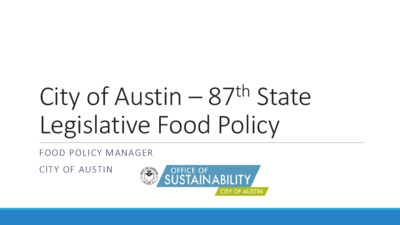
City of Austin – 87th State Legislative Food Policy FOOD POLICY MANAGER CITY OF AUSTIN Policy and Funding DATE FILED TRACK BILL NUMBER AUTHOR Companion TITLE SNAP HB 343 Cain Relating to prohibiting the purchase of certain food and drink items under the supplemental nutrition assistance program. 11/09/20 SNAP HB 319 Springer Relating to work requirements and employment and training services for certain persons receiving benefits under the supplemental nutrition assistance program. 12/02/20 SNAP HB 701 Walle, Armando 12/02/20 SNAP SNAP SB 224 SB 170 SB 224 Perry and West Blanco, Cesar (F) Perry, Charles 11/09/20 Tax Credit HB 209 Thierry SB 224 HB 701 Relating to simplified certification and recertification requirements for certain persons under the supplemental nutrition assistance program. Relating to simplified certification and recertification requirements for certain persons under the supplemental nutrition assistance program. Study regarding feasibility implementing SNAP simplified certification (companion to HB 701) Relating to a franchise tax credit for entities that establish a grocery store or healthy corner store in a food desert. 11/30/20 Disaster HB 671 Martinez Relating to establishment of the disaster identification system for a declared state of disaster. What’s next? •Participation in Texas Food Policy Roundtable •Tracking local agriculture and food processing bills •SNAP Incentive Working Group • Recommendation from HSSC in October •Planning for extension of COVID 19 emergency feeding programs/funding •Food Policy Board recommendation •Tracking direction of the new USDA secretary
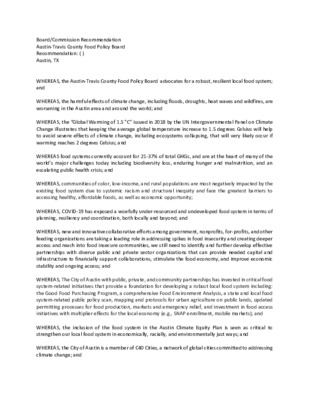
Board/Commission Recommendation Austin-Travis County Food Policy Board Recommendation: ( ) Austin, TX WHEREAS, the Austin-Travis County Food Policy Board advocates for a robust, resilient local food system; and WHEREAS, the harmful effects of climate change, including floods, droughts, heat waves and wildfires, are worsening in the Austin area and around the world; and WHEREAS, the “Global Warming of 1.5 °C” issued in 2018 by the UN Intergovernmental Panel on Climate Change illustrates that keeping the average global temperature increase to 1.5 degrees Celsius will help to avoid severe effects of climate change, including ecosystems collapsing, that will very likely occur if warming reaches 2 degrees Celsius; and WHEREAS food systems currently account for 21-37% of total GHGs, and are at the heart of many of the world’s major challenges today including biodiversity loss, enduring hunger and malnutrition, and an escalating public health crisis; and WHEREAS, communities of color, low-income, and rural populations are most negatively impacted by the existing food system due to systemic racism and structural inequity and face the greatest barriers to accessing healthy, affordable foods, as well as economic opportunity; WHEREAS, COVID-19 has exposed a woefully under-resourced and undeveloped food system in terms of planning, resiliency and coordination, both locally and beyond; and WHEREAS, new and innovative collaborative efforts among government, nonprofits, for-profits, and other feeding organizations are taking a leading role in addressing spikes in food insecurity and creating deeper access and reach into food insecure communities, we still need to identify and further develop effective partnerships with diverse public and private sector organizations that can provide needed capital and infrastructure to financially support collaborations, stimulate the food economy, and improve economic stability and ongoing access; and WHEREAS, The City of Austin with public, private, and community partnerships has invested in critical food system-related initiatives that provide a foundation for developing a robust local food system including: the Good Food Purchasing Program, a comprehensive Food Environment Analysis, a state and local food system-related public policy scan, mapping and protocols for urban agriculture on public lands, updated permitting processes for food production, markets and emergency relief, and investment in food access initiatives with multiplier effects for the local economy (e.g., SNAP enrollment, mobile markets); and WHEREAS, the inclusion of the food system in the Austin Climate Equity Plan is seen as critical to strengthen our local food system in economically, racially, and environmentally just ways; and WHEREAS, …
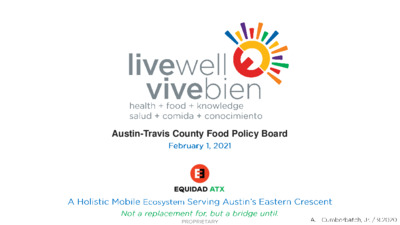
Austin-Travis County Food Policy Board • • • • • • • • • • • • • • • • • • • • • • • • • o o o o • • • • • • • • • • • • • • • • • • • • • • • • • • • • • • • • • • • • • • •